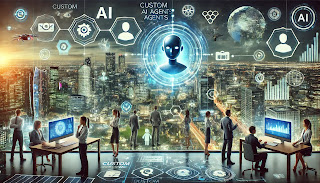What Strategic Advantages Can Businesses Gain from Custom AI Agent Development in 2025?
In the age of hyper-automation and digital transformation, Custom AI Agent Development has emerged as a vital solution for enterprises looking to automate workflows, enhance decision-making, and drive scalability. Businesses across industries—finance, healthcare, e-commerce, logistics, and beyond—are leveraging AI agents to streamline operations, personalize customer interactions, and reduce operational inefficiencies. These intelligent agents, powered by machine learning, natural language processing (NLP), and real-time analytics, are not only performing repetitive tasks but also adapting to dynamic business environments with cognitive intelligence.
What Is AI Agent Development?
AI agent development involves designing autonomous software entities—called AI agents—that can perceive their environment, process information, make decisions, and take actions to achieve specific goals. These agents can range from simple rule-based bots to advanced large language model (LLM) based agents with multi-turn reasoning capabilities and access to tools.
There are several types of AI agents:
-
Reactive Agents: Operate based on predefined rules.
-
Model-Based Agents: Understand the environment and adapt strategies.
-
Goal-Based Agents: Make decisions to achieve specific objectives.
-
Utility-Based Agents: Optimize actions for maximum efficiency or value.
-
Learning Agents: Improve behavior over time using machine learning.
Businesses often require a combination of these types to meet complex operational goals, which is where custom AI agent development comes into play.
Key Capabilities of AI Agents
Modern AI agents possess a range of capabilities that extend far beyond traditional automation. Here are some of the core functionalities:
-
Natural Language Understanding (NLU): Enables agents to interpret and respond to human language inputs accurately.
-
Multi-Modal Interaction: Supports voice, text, image, and video inputs, making agents highly adaptable across channels.
-
Context Retention: Remembers user preferences, past interactions, and data points to provide coherent and personalized experiences.
-
Autonomous Decision-Making: Uses probabilistic reasoning or reinforcement learning to make choices under uncertainty.
-
Tool Use and Integration: Interacts with third-party software, APIs, databases, and enterprise systems.
-
Scalability: Can handle millions of queries or tasks simultaneously with cloud-native architectures.
Use Cases Across Industries
1. E-commerce: Personalized Shopping Assistants
AI agents are revolutionizing online retail by acting as virtual shopping assistants that offer tailored product recommendations, manage customer queries, and even handle transactions. They analyze user behavior, purchase history, and preferences in real-time to deliver hyper-personalized experiences.
2. Healthcare: Virtual Medical Assistants
In healthcare, AI agents assist with patient triaging, medical transcription, symptom checking, and even post-discharge follow-ups. They reduce the administrative burden on practitioners and improve patient engagement.
3. Finance: Intelligent Investment Advisors
Financial firms deploy AI agents to offer robo-advisory services, fraud detection, credit scoring, and real-time financial news summarization. These agents enhance decision accuracy and risk management capabilities.
4. Customer Service: AI-Powered Chatbots
AI agents handle a large volume of customer service tickets by understanding and resolving issues autonomously. They seamlessly escalate complex cases to human agents when needed, ensuring continuity and satisfaction.
5. Manufacturing: Predictive Maintenance Agents
Agents analyze sensor data to predict equipment failure, optimize maintenance schedules, and minimize downtime, thereby increasing asset utilization and operational efficiency.
Architecture of a Modern AI Agent
An effective AI agent system typically includes the following layers:
-
Perception Layer: Captures input from the environment using sensors or APIs (e.g., user messages, camera feeds).
-
Processing Layer: Analyzes data using machine learning or NLP models.
-
Decision-Making Layer: Applies rules, goals, or reinforcement learning to make intelligent decisions.
-
Action Layer: Executes commands or provides outputs (e.g., sending emails, updating databases).
-
Learning Layer: Continuously refines its models based on user feedback and outcomes.
This modular architecture ensures flexibility, upgradability, and interoperability with other business systems.
Why Businesses Are Investing in AI Agent Development
1. Operational Efficiency
By automating high-volume tasks such as data entry, reporting, and customer queries, AI agents free up human capital for strategic initiatives.
2. Cost Reduction
Replacing repetitive human tasks with intelligent agents significantly lowers labor costs, particularly in customer service, IT support, and administrative roles.
3. 24/7 Availability
AI agents do not require breaks or sleep, ensuring uninterrupted business operations, especially valuable for global enterprises.
4. Data-Driven Insights
AI agents can process and synthesize vast datasets in real-time, offering actionable insights that improve decision-making and customer understanding.
5. Competitive Advantage
Businesses that deploy custom agents tailored to their unique workflows can gain a strong edge over competitors still reliant on legacy systems.
Trends Shaping the Future of AI Agents
As the ecosystem evolves, several trends are emerging:
-
Autonomous Multi-Agent Systems (MAS): Networks of agents working collaboratively to solve complex tasks.
-
Agentic LLMs: Advanced AI agents powered by large language models (e.g., GPT, Claude) that reason, code, and even self-improve.
-
Emotionally Intelligent Agents: Agents that detect user sentiment and adapt responses accordingly.
-
Low-Code Agent Builders: Platforms that allow non-tech users to design and deploy AI agents using visual workflows.
-
On-Device AI Agents: Edge-based agents that operate locally for privacy, speed, and offline capabilities.
These innovations are rapidly redefining the boundaries of what AI agents can achieve across every business function.
Conclusion: The Need for Custom AI Agent Development
As enterprises aim to digitize every aspect of their operations and improve responsiveness, AI agents are no longer a luxury—they are a necessity. However, off-the-shelf agents often fall short in meeting the nuanced requirements of different industries and departments. That’s why Custom AI Agent Development has become the go-to approach for future-forward organizations.
Tailoring agents to match unique workflows, integrate seamlessly with existing infrastructure, and evolve based on business goals ensures long-term value. Whether it’s building an intelligent assistant for sales automation or a fleet of agents to optimize supply chains, the right custom AI agent can become a true business enabler. Partnering with experts in custom AI agent development empowers businesses to transform aspirations into intelligent, scalable, and cost-efficient automation solutions.




Comments
Post a Comment